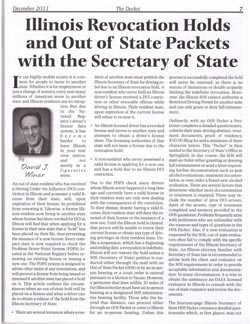Out of State Hearings
Illinois Revocation Holds and Out of State Packets with the Secretary of State
~ by David J. Winer
Every year many Americans move to another state and have an Illinois revocation from a DUI or other conviction. Due to the federal data based called the “National Registry” advises all states of a revocation hold and prohibits a person from obtaining or renewing a license in another state. Every Compact State is now required to check the National Registry before renewing an existing license or issuing a new one. This article outlines what an out of state resident must do to obtain a release of the revocation hold from the Illinois Secretary of State. Unlike a suspension, which has a beginning and ending date, revocation is indefinite.
Also, due to the National Registry many drivers whose Illinois arrest happened many years ago and currently have a valid license in their resident state are only now dealing with the consequences of the conviction. To their dismay, despite having a valid license, their resident state will deny the renewal or the issuance of a new one. Until the Illinois hold is cleared, they are unable to renew their current license.
There are several reasons where an out of state t of another state must petition the Illinois Secretary of State for driving relief due to an Illinois revocation hold.
- An Illinois licensed driver had a revoked license here, and then moved to another state and attempted to obtain a driver’s license there. The DMV of that state will not issue a new license due to the revocation hold.
- A non-resident who never held an Illinois license and received a DUI conviction or other revocable offense in Illinois. Their resident state, upon expiration of their current license will refuse to renew it.
- A non-resident who never possessed a valid license applies for and has a hold from Illinois.
OUT-OF-STATE RESIDENTS
To be eligible to apply for clearance the driver must have already passed their Illinois revocation eligibility date, except those with a Lifetime revocation due to 4 or more DUI’s can only apply for clearance 10-years from the date of the last revocation in any state and are required to attend an in-person Formal Hearing unless a hearing officer makes a determination that there are “material extenuating circumstances.” There are a few States that may grant a Restricted Driving Permit but cannot issue a new license doe to the Illinois hold.
The rules governing reinstatement eligibility for out-of-state residents are the same as for Illinois residents. For Illinois DUI convictions (as opposed to Supervision) they are as follows.
- First DUI conviction results in a one-year revocation, but those under 21 years old when arrested receive a two-year revocation
- Second DUI conviction results in a five-year revocation
- Third DUI conviction results in a ten-year revocation.
- A fourth conviction results in a lifetime revocation, if any of the convictions was after 01/01/ 1999.
With an Illinois OOS Packet through the mail (or email) a Petitioner completes a detailed questioner, submits proof of treatment, residency, character letter and obtain an evaluation by an Illinois licensed provider by Zoom or online. The Illinois Packet contains a detailed questioner which, at first glance, may not appear very complicated. However, the Secretary of State is very particular about the information requested, and incorrect answers or improperly prepared documentation can not only result in a Denial Order, but also make it much more difficult to succeed on future petitions.
The OOS Packet consists of a form where the first part, 4 pages long, is completed by the petitioner and the second section by an OASA licensed evaluator. The Packet is then sent to the Secretary of State Office in Springfield. Typically, within three to four months the SOS mails an Order either granting or denying full reinstatement, although the SOS is mandated to make the ruling within 180 days.
Unless this process is completed the hold will never be removed, as there is no statute of limitations or double jeopardy limiting the indefinite revocation. Moreover, the Illinois SOS cannot authorize a Restricted Driving Permit for another state and can only grant or deny clearance of the revocation hold on the National Registry. A few states do allow Restricted Driving Permits
If a person was previously denied relief through an OOS Packet or in-person hearing, the attorney must obtain the Denial Order and all the previously submitted documentation. This can be obtained from the client or ordered from the Illinois Secretary of State Archive Department. In addition to reviewing the SOS Denial Order, the attorney must carefully scrutinize all the documentation to determine the specific reasons for the denial and then assist in remedying them. An Illinois attorney familiar with Secretary of State law is highly recommended to advise both the client and evaluator on the SOS requirements in order to provide acceptable information and documentation.
In conclusion, many non-Illinois residents lost their driving privileges due to an Illinois DUI conviction. In their resident state they may have been driving for years, even decades, only to lose it when their license is up for renewal. While Illinois revoked residents who move to another state are prohibited from being issued a new driver’s license. Due to the National Registry check a revocation hold from Illinois will follow them forever and wherever they live. Only by successfully petitioning the Illinois Secretary of State through an Out-of-State Packet or an in-person hearing will they ever be able to remove the hold and legally drive again in their resident state.
David J. Winer, a partner at the Law Offices of Winer & Winer, writes and lectures on matters regarding driver’s license reinstatement through the Illinois Secretary of State. He has also presented Illinois Continuing Legal Education seminars on this topic. Evan J. Winer assisted in editing this article.

